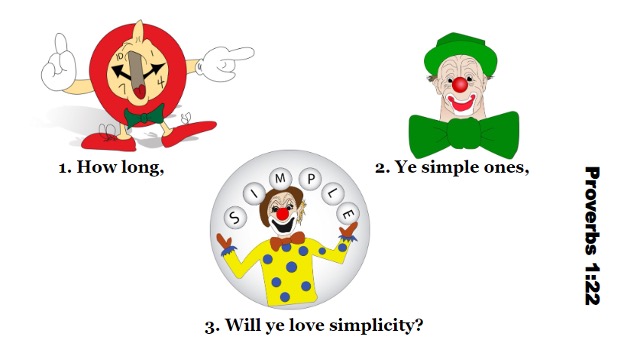
The Clock’s Call to Maturity: Navigating Foolishness and Fostering Growth
Illustration Explanation for Proverbs 1:22
How long, you simple ones, will you love simplicity? For scorners delight in their scorning, And fools hate knowledge.
Directions: Look carefully at the pictures and the words underneath. Read the words out loud five times. This will help to commit the scripture to memory. Next you will want to work with our electronic quizzes to further guarantee full memorization of this Proverb and many others. The flashcards are on cardstock and can be sent via USPS but quizzes are only available electronically and will be sent via email. The electronic document allows you to edit if you make a copy so you are able to type in the word changes that reflect your Bible translation preference:
https://docs.google.com/presentation/d/1tHrN9J2XG8ckoM1BGl2SEIpYCw-ra4RbQX91ICvnH9Q/edit#slide=id.p1

Imagine a scene where a personified clock stands tall, its hands ticking loudly as it addresses the simple individuals of the world with a resounding “How long?” Now imagine a clown standing nearby, symbolizing simplicity due to his tendency towards acting like a dolt, with stupid, naive and silly tricks. The clock’s inquiry is directed at the clown, questioning how long, silly clown, will your love for this kind of behavior continue? When will you reconsider your ways and exhibit good judgment, maturity, and better decision-making skills?
The clown’s portrayal represents a person named Titan. He has shown himself lacking in intellect, in the classroom, with friends and at his job. He is devoid of understanding and common judgment in these settings. Titan speaks and acts like the simple clown of Proverbs 1:22. He serves as a reminder that silliness and nonsense behavior can lead one to be dismissed and not taken seriously by others being perceived as feeble minded and immature.
For example, in his classroom environment, Titan repeatedly asks irrelevant or off-topic questions during a lesson, disrupting the flow of the class and irritating the teacher and his peers. This behavior demonstrates a lack of focus and understanding. He does not care and even loves the fact that his contributions are not connected to learning because he laughs off any correction. It fuels him to do it even more. He loves simplicity. The Hebrew word for simplicity is Pethiy, which means silly (i.e. seducible): foolish, naive, open-minded. Perhaps he is so open-minded that he is easily seduced by the wrong people. He acts like other clowns because he is a follower. Instead, the smarter move would be to look around and observe another type of student. The majority of the mature students will contribute by actively engaging with the material being taught. This can include asking thoughtful questions related to the lesson content, participating in class discussions, and offering insights or perspectives that enhance understanding.
Further, during social interactions, Titan’s absurd ways continue as he engages in juvenile and immature behavior, such as making inappropriate jokes, noises or teasing others excessively. While he may intend to be funny or entertaining, his behavior comes across as foolish and lacking in social awareness, leading others to view him as a clown. In social interactions, Titan should contribute by engaging in respectful and supportive communication. Rather than making inappropriate jokes or teasing others excessively, he can contribute to positive social dynamics by actively listening to others, offering encouragement, and engaging in meaningful conversations that build connections and foster empathy.
As Titan grew older, his impulsive and reckless behavior began to take a toll. He started skipping school, experimenting with drugs and participating in other reckless activities. Studies show that adolescents who engage in substance abuse, like experimenting with drugs and alcohol, are at a significantly higher risk of experiencing negative outcomes. In fact, according to a recent survey conducted by the National Institute on Drug Abuse, approximately 23% of high school students report using illicit drugs, with 60% of them starting before the age of 15.
Moreover, research suggests that teenagers who skip school are more likely to struggle academically. Data from the U.S. Department of Education reveals that the high school dropout rate is around 16% nationwide, with absenteeism being a leading contributing factor. Additionally, engaging in dangerous activities, such as reckless driving or participating in extreme sports, significantly increases the risk of accidents and injuries. According to the Centers for Disease Control and Prevention, unintentional injuries are the leading cause of death among adolescents aged 15 to 19.
As Titan continued down this path, his behavior became increasingly concerning. Peer influence played a significant role, with studies indicating that adolescents are heavily influenced by their social circles. In fact, research published in the Journal of Adolescence suggests that teenagers are more likely to engage in risky behaviors if their friends do as well. This phenomenon, known as peer pressure, can further reinforce negative behaviors and attitudes.
Despite the grim statistics, there is hope for individuals like Titan. By practicing impulse management techniques and seeking support from positive influences, he can begin to make positive changes in his life. For example, implementing strategies such as setting boundaries, creating action plans, or seeking professional help can significantly improve outcomes. With determination and support, individuals can break free from destructive patterns and pave the way for a brighter future.
The clock’s question serves as a catalyst for a desire for improvement. As students of the Word, we should recognize this call to change as early as possible in life. Here are three ways to respond:
- Self reflection: Do you ask silly questions or behave in a foolish, reckless or impulsive manner? Through self reflection it is possible to see that certain actions can be perceived as immature.
- Mindful conduct: Strive to be more conscious of your conduct and adjust yourself accordingly in varying situations.
- Growth and Development: Through self-awareness, reflection, and mindful conduct, the simple person represented by the clown can experience personal growth and development.
Ultimately, through the metaphor of the clock calling the clowns of the world to action, Proverbs 1:22 suggests individuals can overcome their tendencies to act absurd and reckless by recognizing areas for improvement and actively working to enhance one’s judgment, and maturity. If one does not heed the lessons here, like Titan over time, the individual’s reputation may suffer. In academic settings, he may struggle to focus on his studies and may face consequences such as poor grades or disciplinary actions due to disruptive behavior. His relationships with peers may become strained as others grow frustrated with the immaturity and inability to engage in meaningful interactions.
The outcome of anyone’s future depends on his willingness to recognize the need for personal change and take proactive steps to improve in good judgment, maturity, and decision-making skills. Do you hear the metaphorical call of the clock beckoning you to become more sophisticated in social situations, more capable on the job, stronger intellectually in the classroom, and overall more wise in the way you speak and act in every situation?
Name: _________________
Date: _________________
Proverbs 1:22
How long, you simple ones, will you love simplicity? For scorners delight in their scorning, And fools hate knowledge.
Activity 1: Content Vocabulary
- Read the definitions provided for the content vocabulary from the reading to enhance your understanding. Afterward, respond to the questions.
Simple: having or showing little sense or reasoning ability; easily misled or deceived
Silly: simple; plain; innocent; feeble; helpless; having or showing little sense, judgment or sobriety; foolish, stupid, absurd, irrational
Seducible: to persuade to do something disloyal, disobedient; to persuade or tempt to evil or wrong-doing; lead astray
Foolish: without good sense or wisdom; silly; unwise; ridiculous; absurd
- What does simple mean?
- What are the three other synonyms for simple?
- Which definitions remind you of something you have done before?
- How can simple people be foolish?
Activity 2: Comprehension Questions
- Answer the following comprehension questions below each question.
1. How does the clock symbolize the call for change in the text?
2. What does the clown represent in the passage, and how does his behavior impact his perception by others?
3. How does Titan’s behavior in the classroom disrupt the learning environment, and what are the consequences of his actions?
4. What are some negative outcomes associated with teenage substance abuse, according to the text?
5. How does peer influence contribute to Titan’s behavior, and what role does peer pressure play in reinforcing negative behaviors?
6. According to the text, what percentage of high school students report using illicit drugs, and at what age do approximately 60% of them start experimenting with drugs?
7. What is the nationwide high school dropout rate mentioned in the text, and what percentage of this rate is attributed to absenteeism, according to data from the U.S. Department of Education?
Activity 3: Discussion Questions
- Contemplate each critical thinking question and answer two that resonate with you.
- How do you interpret the clock’s proclamation of “How long?” in relation to your own behavior and actions? Do you see parallels between the clown’s simplicity and any aspects of your own conduct?
- When the passage mentions “self-reflection” and “mindful conduct,” how do you personally approach these concepts in your daily life? Can you recall instances where self-reflection has led to growth or changes in your behavior?
- Reflecting on the examples of disruptive behavior mentioned in the passage, how might you evaluate the potential consequences of your actions in various settings, such as the classroom, social interactions, or decision-making situations? How can you develop greater self-awareness and foresight to avoid behaviors that may be perceived as immature or lacking in responsibility?
- Considering the impact of social perceptions discussed in the passage, how do you navigate situations where you might feel pressure to conform to certain behaviors or social norms, even if they contradict your personal values or principles? How can you maintain authenticity and integrity while also considering the perceptions and expectations of others?
Activity 4: Coloring Activity
- Color the images below and look carefully at the pictures and write the words underneath the picture from Proverbs 1:22. The scripture can be written from your preferred Bible translation. Read the scripture out loud five times while looking closely at the picture. This will help to commit the scripture to memory. Next you will want to work with our electronic quizzes to further guarantee full memorization of this Proverb and many others.


